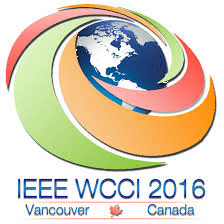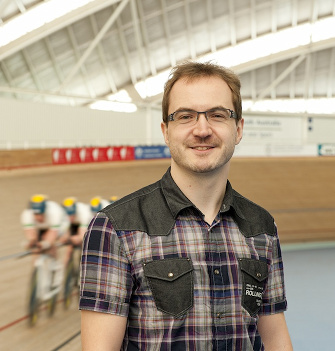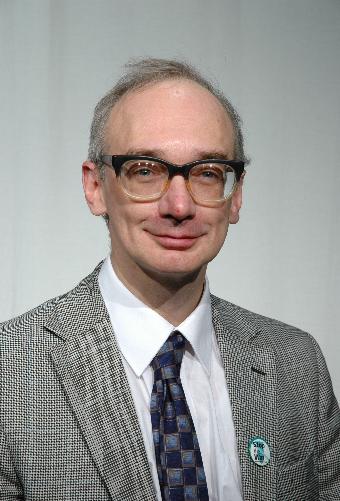Genetic Improvement of Software
and SBSE

 Genetic Improvement of Software
Genetic Improvement of Software
and SBSE
Special Session
CEC 25-29 July 2016 Vancouver

|
Location | Vancouver
Conference Centre,
25-29 July 2016.
|
|
West Building
Level 2 Room: 205
Vancouver Convention Centre West
1055 Canada Place
Vancouver, BC
V6C 0C3
Canada
Weather
|
|
Publication |
IEEE Press
|
|
|
|
Publication |
IEEE Press
|
Registration |
info
|
Aim and Scope
In the past ten years there has been a dramatic increase in work on
Search-Based Software Engineering (SBSE), an approach to software
engineering in which search-based optimisation algorithms are used to
address problems.
Evolutionary Computation (genetic algorithms,
GAs, genetic programming, GP, ES, DE, GE, etc.) and other stochastic
techniques are often used (SA, tabu, MCTS).
The approach is attractive because it offers a suite
of adaptive automated and semi-automated solutions in situations
typified by large complex problem spaces with multiple competing and
conflicting objectives. SBSE has been applied to a number of software
engineering activities, right across the life-cycle from requirements
engineering, project planning and cost estimation through testing, to
automated maintenance,
bug repair, porting, automatic parallelisation,
performance improvements,
service-oriented software engineering, compiler
optimisation and quality assessment.
The GI@CEC-2016 special session at the 2016 IEEE World Congress on Computational Intelligence
provides an opportunity to showcase recent breakthroughs in
automatic improvement of Software using optimisation
(particularly genetic, stochastic or search based) techniques.
Such as:
software transplanting,
growing and grafting new code, genetic improvement, loop perforation,
constraint based program synthesis and multi-objective Pareto trade-offs between
functional and non-functional properties, such as speed, accuracy,
solution quality, memory and improved efficiency.
We invite submissions on any aspect of SBSE, including, but not
limited to, genetic improvement
theoretical results and interesting new applications. The
suggested topics cover the entire range of functional and
non-functional properties:
- bandwidth minimisation
- latency minimisation
- fitness optimisation
- energy optimisation
- software specialisation
- memory optimisation
- software transplantation
- bug fixing
- multi-objective SE optimisation
Timetable Thursday, 28 July 2016.
(Room: 205)
5:50--6:10
#E-16364
Product Selection Based on Upper Confidence
Bound MOEA/D-DRA for Testing Software Product
Lines
Thiago do Nascimento Ferreira,
Josiel Neumann Kuk,
Aurora Pozo,
Silvia Regina Vergilio.
slides
6:10--6:30
#E-16921
Automatic Lock-free Parallel Programming on Multi-core Processors
Gopinath Chennupati,
R Muhammad Atif Azad,
Conor Ryan
YouTube
mp4 video
Special Session Organisers
Markus Wagner,
markus.wagner@
School of Computer Science
The University of Adelaide, Australia
adelaide.edu.au
W. B. Langdon,
w.langdon@
Department of Computer Science,
University College, London
cs.ucl.ac.uk
Brad Alexander
brad@
School of Computer Science
The University of Adelaide, Australia
cs.adelaide.edu.au
Publication
As with other WCCI papers, papers accepted by GI@CEC-2016
will be disseminated by the IEEE and become part of its electronic
archive.
The Team
Dr. Markus Wagner
(University of Adelaide, Australia)

Markus is a Lecturer at the School of Computer Science, University of
Adelaide, Australia. He obtained his PhD studies at the Max Planck
Institute for Informatics in Saarbruecken, Germany and at the
University of Adelaide, Australia. His research topics range from
mathematical runtime analysis of heuristic optimisation algorithms and
theory-guided algorithm design to applications of heuristic methods to
renewable energy production, professional team cycling and software
engineering. He has written more than 50 articles with over 50
different co-authors in total.
Dr. W. B. Langdon
(University College London)

William B. Langdon's research includes using genetic programming
to genetically improve
existing software, search based software engineering and
Bioinformatics. Indeed GI has been used to significantly improve a
widely used Bioinformatics tool, nVidia software running on graphics
hardware and a GPU kernel for NMR medical imaging registration.
He co-organised the computational intelligence on GPUs (CIGPU) series
of workshops and special sessions at WCCI
(2008,
2010 and
2012)
started the EvoPAR track in the European conference on applications of
evolutionary computation and several times he has co-chaired EuroGP and GECCO.
His books include
A Field Guide to Genetic Programming,
Genetic Programming + Data Structures
and
Advances in Genetic Programming 3.
He also maintains the
genetic programming bibliography.
Dr. Brad Alexander
(University of Adelaide, Australia)

Brad's research interests include program optimisation, rewriting,
genetic-programming (GP) - especially the discovery of recurrences and
search-based-software-engineering. He has also supervised successful
projects in the evolution of control algorithms for robots, the
evolution of three-dimensional geological models, and the synthesis of
artificial water distribution networks, and using background
optimisation to improve the performance of instruction set simulators
(ISS)'s. He has also worked on improving algorithms for the analysis
of water distribution networks.
Programme Commitee
CEC 2016 SBSE Tutorial
Search Based Software Engineering: Foundations, Recent Advances, Challenges and Future Research Directions
Marouane Kessentini
Other GI and SBSE sites
A few links to other pages interested in genetic improvement of
software (GI)
Photographs of WCCI 2016
WCCI 2016
More Photographs of Vancouver
Pictures of Vancouver from:
WCCI 2006
Nic McPhee
CIRG.
HeuristicLab.
EvoCinv
W. B. Langdon
18 Nov 2015
(last update 25 October 2025)


 Genetic Improvement of Software
Genetic Improvement of Software


